
Keeping a Godly Mind in a Modern Media World
What Are the Internet, Social Media, TV, and Movies Doing to Us?
We live in a world today that is fraught with an incredible array of electronic gadgetry which competes for our attention. These devices and media have developed through a long line of communications methods which can be traced back to ancient times. Notice the time line of these developments below.
Visual, auditory and ancillary methods (non-electrical)
-
- Prehistoric: Fires, beacons, smoke signals, communication drums, horns
- 6th century BC: Mail
- 5th century BC: Pigeon post
- 4th century BC: Hydraulic semaphores
- 15th century BC: Maritime flag semaphores
- 1672: First experimental acoustic (mechanical) telephone
- 1790: Semaphore lines (optical telegraphs)
- 1867: Signal lamps
- 1877: Acoustic phonograph
- 1900: Optical picture
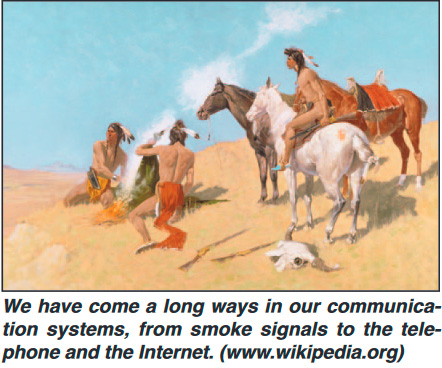 Basic electrical signals
Basic electrical signals
-
- 1838: Electrical telegraph
- 1830s: Beginning of attempts to develop “wireless telegraphy,” systems using some form of ground, water, air, or other media for conduction to eliminate the need for conducting wires.
- 1858: First trans-Atlantic telegraph cable
- 1876: Telephone
- 1880: Telephony via lightbeam photophones
Advanced electrical and electronic signals
-
- 1896: First practical wireless telegraphy systems based on radio
- 1990: First television displayed only black and white images. Over the next decades, color television were invented, showing images that were clearer and in full color.
- 1914: First North American transcontinental telephone calling
- 1927: First commercial radio-telephone service, U.K. to U.S.
- 1930: First experiental videophones
- 1934: First commercial radio-telephone service, U.S. to Japan
- 1936: World’s first public videophone network
- 1946: Limited capacity Mobile Telephone Service for automobiles
- 1947: First working transistor
- 1950: Semiconductor era begins
- 1956: Transatlantic telephone cable
- 1962: Commercial telecommunications satellite
- 1964: Fiber optical telecommunications
- 1965: First North American public videophone network
- 1969: Computer networking
- 1973: First modern-era mobile (cellular) phone
- 1974: Internet
- 1979: INMARSAT ship-to-shore satellite communications
- 1981: First mobile (cellular) phone network
- 1982: SMTP email
- 1998: Mobile satellite hand-held phones
- 2003: VoIP Internet Telephony
In “A Brief History of the Internet” (B.M. Leiner, et al., www.internetsociety.org, 1997), some early developers of the Internet had this to say.
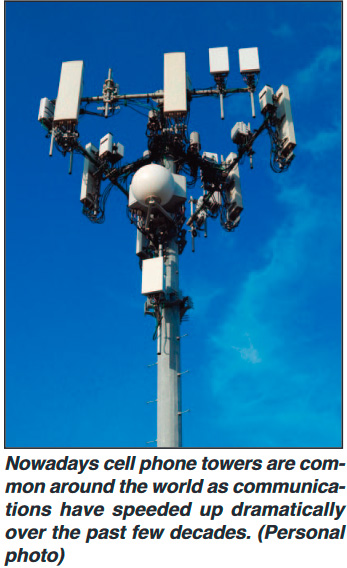 “The Internet has revolutionized the computer and communications world like nothing before. The invention of the telegraph, telephone, radio, and computer set the stage for this unprecedented integration of capabilities. The Internet is at once a world-wide broadcasting capability, a mechanism for information dissemination, and a medium for collaboration and interaction between individuals and their computers without regard for geographic location. The internet represents one of the most successful examples of the benefits of sustained investment and commitment to research and development of information infrastructure. Beginning with the early research in packet switching, the government, industry, and academia have been partners in evolving and deploying this exciting new technology. Today, terms like ‘bleiner@computer.org’ and ‘http://www.acm.org’ trip lightly off the tongue of the random person on the street.
“The Internet has revolutionized the computer and communications world like nothing before. The invention of the telegraph, telephone, radio, and computer set the stage for this unprecedented integration of capabilities. The Internet is at once a world-wide broadcasting capability, a mechanism for information dissemination, and a medium for collaboration and interaction between individuals and their computers without regard for geographic location. The internet represents one of the most successful examples of the benefits of sustained investment and commitment to research and development of information infrastructure. Beginning with the early research in packet switching, the government, industry, and academia have been partners in evolving and deploying this exciting new technology. Today, terms like ‘bleiner@computer.org’ and ‘http://www.acm.org’ trip lightly off the tongue of the random person on the street.
“This history revolves around four distinct aspects. There is the technological evolution that began with early research on packet switching and the ARPANET (and related technologies), and where current research continues to expand the horizons of the infrastructure along several dimensions, such as scale, performance, and higher-level functionality. There is the operations and management aspect of a global and complex operational infrastructure. There is the social aspect, which resulted in a broad community of internauts working together to create and evolve the technology. And there is the commercialization aspect, resulting in an extremely effective transition of research results into a broadly deployed and available information infrastructure.”
The authors of these words also went on to explain that DARPA, the Defense Advanced Research Projects Agency, had a direct hand in developing the Internet. In their own words:
“For sixty years, DARPA has held to a singular and enduring mission: to make pivotal investments in breakthrough technologies for national security. Working with innovators inside and outside of government, DARPA has repeatedly delivered on that mission, transforming revolutionary concepts and even seeming impossibilities into practical capabilities The ultimate results have included not only game-changing military capabilities such as precision weapons and stealth technology, but also such icons of modern civilian society such as the Internet, automated voice recognition and language translation, and Global Positioning System receivers small enough to embed in myriad consumer devices” (www.darpa.mil).
These admissions reveal the government’s and military’s stake in developing the Internet and other electronic breakthroughs. The potential for such technologies to be used to manipulate and capture the very citizens the organization was designed to protect cannot be overstated, even as we see today’s weaponization of government agencies like the FBI, CIA, FDA, NIH, and others to turn on their own citizens.
The rapid developments of digital electronic devices made possible the instantaneous communications we have today, where a person can talk with someone by telephone 12,000 miles away in Australia from a telephone in the United States, or send an email via the Internet to anyone in the world, from a desktop or laptop computer to another such device at that distant locale. The same can be said for cell phones and smart phones (iPhones). Messages can be sent in a moment by telephone, iPhone or computer through a massive array of telephone lines, underground metal or fiber optic cables, undersea cables, satellites, relay towers, and cell phone towers. The 5G millimeter wave cell phone system now makes possible an incredible load of information to be sent rapidly to anywhere in the world.
A Sinister Goal in Mind?
 We know that Satan is the god of this world (II Corinthians 4:4; Ephesians 2:2; Matthew 4:8-9), whose objective is to destroy the people on earth made in Elohim’s image, whose destiny is ultimately to become very God, brothers of Jesus Christ in the heavenly realm (Romans 8:29; I John 3:2; I Corinthians 15:49; Philippians 3:21; Colossians 3:4; II Peter 1:4). This sinister, powerful spirit being, who confronts the Father’s glorious plan to multiply His sons that will; be reigning on the earth (Revelation 5:10; 20:4), will stop at nothing to try and derail the efforts of the elect to overcome evil. As a liar and deceiver, a murderer and an evil-doer (John 8:44; I Timothy 2:14; Revelation 20:3,) he will attempt to utilize every tool that mankind has invented. He will even motivate brilliant minds to invent tools which he can then commandeer through evil cohorts to further his destructive agenda.
We know that Satan is the god of this world (II Corinthians 4:4; Ephesians 2:2; Matthew 4:8-9), whose objective is to destroy the people on earth made in Elohim’s image, whose destiny is ultimately to become very God, brothers of Jesus Christ in the heavenly realm (Romans 8:29; I John 3:2; I Corinthians 15:49; Philippians 3:21; Colossians 3:4; II Peter 1:4). This sinister, powerful spirit being, who confronts the Father’s glorious plan to multiply His sons that will; be reigning on the earth (Revelation 5:10; 20:4), will stop at nothing to try and derail the efforts of the elect to overcome evil. As a liar and deceiver, a murderer and an evil-doer (John 8:44; I Timothy 2:14; Revelation 20:3,) he will attempt to utilize every tool that mankind has invented. He will even motivate brilliant minds to invent tools which he can then commandeer through evil cohorts to further his destructive agenda.
Starting with our very first parents, Satan appeared as a glorious spirit of light (II Corinthians 11:14) when he tempted Eve in the Garden of Eden. Rather than affirming God’s warning not to eat of the tree of the knowledge of good and evil lest she die, Satan subtly argued,
“Then the serpent said to the woman, ‘You will not surely die. For God knows that in the day you eat of it your eyes will be opened, and you will be like God, knowing good and evil’” (Genesis 3:4-5).
We know the story well. Eve offered the forbidden fruit to Adam, and thereafter they were headed down the road to aging and death. Ever since that fateful day in the Garden the Adversary has continued his deception of mankind, working through people who usually unwittingly carry out his devious will, for he “… deceives the whole world …” (Revelation 12:9). The means of mankind to better his state on earth may begin with the grandest aspirations, but over time workers of evil worm their way into positions of influence and pervert even the finest of aspirations … twisting marvelous inventions towards evil.
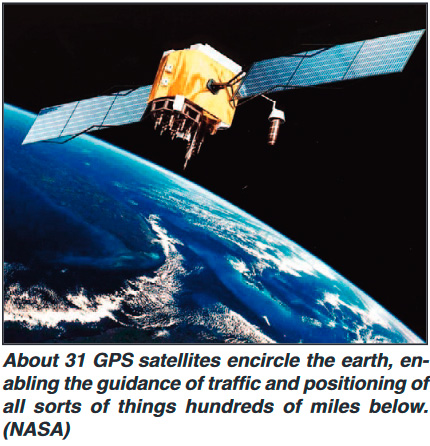 For example, the millennia-old practice of harvesting grain using a sickle was replaced with the reaper, and from that humble change developed the tractor-pulled or self-propelled combine. One farmer could perform the work of many farm hands. The result: farm size increased since machines replaced labor, and farmers and farmers’ sons moved off the land to the cities where work opportunities could be had. Cities grew … and grew, until the larger ones concentrated millions of people who became increasingly divorced from the land, removed further and further from the creation and strong rural community family ties.
For example, the millennia-old practice of harvesting grain using a sickle was replaced with the reaper, and from that humble change developed the tractor-pulled or self-propelled combine. One farmer could perform the work of many farm hands. The result: farm size increased since machines replaced labor, and farmers and farmers’ sons moved off the land to the cities where work opportunities could be had. Cities grew … and grew, until the larger ones concentrated millions of people who became increasingly divorced from the land, removed further and further from the creation and strong rural community family ties.
Satan is called “… the prince of the power of the air …” (Ephesians 2:2); power as used here is from the Greek word exousia, meaning “force, capacity, competency, mastery, or delegated influence.” Air in this verse is aer, which means “the atmosphere.” So, in a very real sence we can visualize that the Devil is the ruler of the realm of the very atmosphere through which electromagnetic frequencies of cell phones and other electronic communications flow. This dominance over information flow indeed extends to wavelengths sent over wires or fiber optics. All of these methods of communication involve energy transmissions that now encircle the earth, and transmit not only verbal messages but digital codes which regulate and command power plants, home heating systems, GPS-guided farm equipment, and missile guidance systems. The whole world operates and interacts at the beck and call of the electromagnetic frequencies which the Devil manipulates!
“For we do not wrestle against flesh and blood, but against principalities, against powers, against the rulers of the darkness of this age, against spiritual hosts of wickedness in the heavenly places” (Ephesians 6:12).
These rulers of darkness lure people into sin by laying traps around them, tempting them to commit unlawful acts; as James 1:15 state, “Then when desire has conceived, it gives birth to sin, and sin, when it is full-blown, brings forth death.” By casting fear into the hearts of men, Satan captures the unwary into relinquishing their decision making to others for the sake of removing such stress. Governments of nations all over the world control their citizens in this way, by fear and force. Yet, we the elect are not to succumb to the fear of men.
“For God has not given us a spirit of fear, but of power and of love and of a sound mind” (II Timothy 1:7).
Sixty-three times in Scripture the words “fear not” appears in the King James Version. These two words stand out as an admonition for all of God’s people to stand firmly against the acts of evil men who may attempt to capture their will. When the Israelites were fleeing Egypt and standing on the shores of the Red Sea, about to be devoured by Pharaoh and his army, Moses said to the people:
“Do not be afraid. Stand still, and see the salvation of the Lord, which He will accomplish for you today. For the Egyptians whom you see today, you shall see again no more forever. The Lord will fight for you, and you shall hold your peace” (Exodus 14:13-14).
The Dangers in Modern Media
Solomon so aptly stated:
“That which has been is what will be, that which is done is what will be done, and there is nothing new under the sun. Is there anything of which it may be said, ‘See, this is new’? It has already been in ancient times before us” (Ecclesiastes 1:9-10).
Could it be that there was a communications infrastructure in pre-Flood days similar to what we see around us today? According to Solomon this seems possible, though we have no record of it, since the Flood washed away that evil society. We know, however, that “… the wickedness of man was great in the earth [in those pre-Flood days], and that every intent of the thoughts of his heart was only evil continually” (Genesis 6:5).
In any case, we must ask how this modern media world might be so bad? Are the media really having a negative effect on our minds and on the way our society functions?
A study at the Olin School of Engineering by Allen Downey, professor of computer science, concluded from a college study that much of the increase in the number of people citing no religious belief increased from 8% to 18% between 1990 and 2010, largely due to Internet use (www.theregister.com). How could that be? Let’s take a deeper look into what the Internet, in particular, does to our brains.
A writer and researcher by the name of Nicholas Carr has spent significant effort analyzing the effects of the Internet on the brain and on thought patterns. In an article entitled “Is Google Making Us Stupid?” (The Atlantic, July/August, 2008), and in a book he wrote based on that article called The Shallows: What the Internet Is Doing to Our Brains (W.W. Norton and Company, 2010) — which I read with considerable zest that same year — Carr quoted media theorist Marshal McLuhan as saying, “Media are not just passive channels of information. They supply the stuff of thought, but they also shape the process of thought.”
Carr began to notice that the Internet seemed to be chipping away at his own capacity for concentration and contemplation, something many of his literary colleagues were also noticing in their own lives. While there have been few studies on the long-term neurological and psychological effects of the Internet, one five-year University College of London study suggested that “We may well be in the midst of a sea change in the way we read and think.” The study found that people using two popular research sites exhibited a form of skimming activity, hopping from one source to another and rarely returning to a source they had already visited. They were “power browsing” through titles, contents, and abstracts, going for a “quick win,” as it were.
The proliferation of text on both the Internet and in text messaging has increased the mountain of words that people read, but reading on the Internet is different from reading hard-copy books and articles. Behind this different way of reading lies a different way of thinking. That thinking places “efficiency” and “immediacy” above all else, which weakens our capacity for deep reading that usually accompanies reading the printed word. With the invention of the printing press, long and complex works became commonplace.
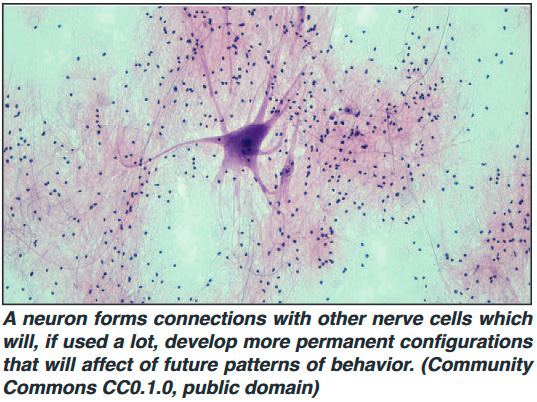 A developmental psychologist from Tufts University, Maryanne Wolf, is quoted in The Story and Science of the Reading Brain as saying some profoundly significant words:
A developmental psychologist from Tufts University, Maryanne Wolf, is quoted in The Story and Science of the Reading Brain as saying some profoundly significant words:
“We have to teach our minds how to translate the symbolic characters we see into the language we understand. And the media or other technologies we use in learning and practicing the craft of reading play an important part in shaping the neural circuits inside our brains.”
These neural circuits created while skimming the Internet are thus different than those created when reading books and printed media. The plasticity of the human brain is amazing, even in adult brains, where old connections formed by regularly practiced habits are broken and reformed into new connections when stimuli change. Thus, we mentally begin to take on the qualities of the technologies that we regularly use. Carr used the invention of the clock to prove this point, citing the cultural critic Lewis Mumford to assert that “The ubiquity of the clock ‘disassociated time from human events and helped create the belief in an independent world of mathematically measurable sequences.’” Carr asserts that this phenomena helped bring “the scientific mind and the scientific man” into being — but that it also took something away: “In deciding when to eat, to work, to sleep, and to rise, we stopped listening to our senses and started obeying the clock.” This transition most certainly has conflicted with the biorhythms that the Creator has built into our minds and bodies
This changing of the brain’s circuitry directly impacts human biology and cognition. The tremendous computing power of today’s computers — with more computing power in a single iPhone than for the first space missions — has led to the Internet becoming a map, clock, printing press, typewriter, calculator, telephone, radio, and TV. When the Internet absorbs a medium, that medium is re-created in the Net’s image. The Internet has more influence than any other electronic medium over human thought, and we frankly do not know how exactly the Internet is reprogramming us … much less comprehend its ethical principles.
Transformed Into Robots
A fellow named Frederick Taylor, who invented a regimented program that placed every part of a steel plant machinist’s job into a sequence of small, discrete steps, created an “algorithm,” we might say today, which showed how each worker should work. The result was a significant increase in productivity in the steel plant, though many of the machinists felt that the system transformed them into robots. Taylor’s assembly line system was quickly adopted by manufacturers worldwide and still remains with us today, albeit with the workers in many plants today replaced by genuine robots. This same system, as applied by computer engineers and software coders, migrates into the realm of our mind and intellectual life.
According to Google’s own words, they desire to systematize everything, including perfecting a search engine that will perfect artifical intelligence. Google believes we would be better off if our brains would be supplemented, or even replaced, by artificial intelligence. This idea that intelligence is the output of a mechanical — not a spiritual — process is the central model of the Internet. The more pages we view, the more money Google makes.
In contrast to the anxiety of “information overload” when viewing volumes of Internet articles, there can be a calming effect of books, their willingness to wait on a shelf for years, waiting for just the right time when a reader will come along and pull them out. It is as if the book is saying softly, “Take your time. I’m not going anywhere.”
The brain is always in a state of creating memories. Short-term memories become long-term memories once the synapses are used multiple times and become conditioned. Reading printed matter makes these long-term connections easier to establish; the volatile Internet does not encourage review in the same way. In fact, I oftentimes find it difficult to remember what I have read on the Internet, so I print out especially impressive information to keep it close by in hard copy to better remember it.
Cell Phone, Movies, and Video Games
The Internet cannot be divorced from iPhones [“smartphones”] and similar devices. Over 80% of teenagers now possess smartphones and use them constantly. Note these statistics for the U.S. (J. Howarth, Time spent using smartphones [2024 statistics], December 24, 2023, www.explodingtopicscom):
Average time spent on the phone: 3 hours and 15 minutes per day
Average number of times the phone is checked: 58 times per day
The most intensive smartphone use is in the Philippines, where users average 5 hours and 47 minutes per day on their phones. Japan has one of the lowest use rates at only 1 hour and 39 minutes per day. This is an astronomical amount of time spent using these phones, which has got to greatly influence the users. Various studies have found a connection between cell phone use and suicides, which have doubled during the past 10 years. Also, one’s sense of self has been affected. It was discovered that university students in the U.S. and Germany were more likely to feel envious of others and worse about themselves if they spent significant time on Facebook. Young woman between 17 and 25 years of age developed a more negative mood after just 10 minutes of browsing Facebook (J Schrader, February 20, 2020, psychologytoday.com). Furthermore, this source says the following:
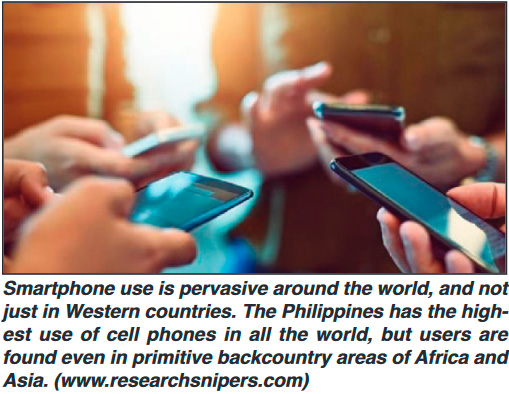 “On the whole, the review found observational evidence that spending time on social networking sites is associated with depression and suicide among youth, especially young girls. Even when interacting with their peers face-to-face, having a phone out leads young people to feel more distracted and have a worse overall mood. The data also show that smartphone use affects sleeping patterns among young people. There is solid evidence that having a handheld electronic device in the bedroom is associated with taking longer to fall asleep, less rapid eye movement sleep (which is essential for rest and health), and reduced levels of alertness the following day.”
“On the whole, the review found observational evidence that spending time on social networking sites is associated with depression and suicide among youth, especially young girls. Even when interacting with their peers face-to-face, having a phone out leads young people to feel more distracted and have a worse overall mood. The data also show that smartphone use affects sleeping patterns among young people. There is solid evidence that having a handheld electronic device in the bedroom is associated with taking longer to fall asleep, less rapid eye movement sleep (which is essential for rest and health), and reduced levels of alertness the following day.”
Besides the effects of cell phones on mental health, these devices are known to adversely affect physical health. With about 97% of American adults using them, these affects gain considerable importance. In an interview with Dr. Joel Moskowitz, a researcher in the School of Public Health at UC-Berkely, the following information was given on the dangers of cell phone radiation (A. Brice, Moskowitz: Cell phone radiation is harmful, but few want to believe it, 2024, www.news.berkely.edu).
“Our 2009 review, published in the Journal of Clinical Oncology, found that heavy cellphone use was associated with increased brain cancer incidence, especially in studies that used higher quality methods and studies that had no telecommunications industry funding. Last year, we updated our review, published in the International Journal of Environmental Research and Public Health, based on a meta-analysis of 46 case-control studies — twice as many studies as we used for our 2009 review — and obtained similar findings. Our main takeaway from the current review is that approximately 1,000 hours of lifetime cellphone use, or about 17 minutes per day over a 10-year period, is associated with a statistically significant 60% increase in brain cancer.”
 Regarding the new 5G millimeter wave generation, Dr. Moskowitz had the following to say:
Regarding the new 5G millimeter wave generation, Dr. Moskowitz had the following to say:
“Millimeter wave radiation is largely absorbed in the skin, the sweat glands, the peripheral nerves, the eyes, and the testes, based upon the body of research that’s been done on millimeter waves. In addition, this radiation may cause hypersensitivity and biochemical alterations in the immune and circulatory systems — the heart, the liver, kidneys, and brain. Millimeter waves can also harm insects and promote the growth of drug-resistant pathogens, so it’s likely to have some widespread environmental effects for the microenvironments around these cell antenna sites.
“Many biologists and electromagnetic field scientists believe the modulation of wireless devices makes the energy more biologically active, which interferes with our cellular mechanisms, opening up calcium channels, for example, and allowing calcium to flow into the cell and into the mitochondria within the cell, interfering with our natural cellular processes and leading to the creation of stress protein and free radicals and, possibly, DNA damage. And, in other cases, it may lead to cell death.”
Then there is the issue of violence and perversion in television, the Internet, in movies, and in video games Of course there is a direct connection between people’s behavior — especially children — and what they see enacted before them. Research has shown that such violence or perversion leads to more physical aggression and loose morality, as well as greater verbal aggression and aggressive thoughts and emotions. Moral barriers are relaxed when sexual sins are acted out before them. For instance:
“A study that surveyed 329 participants between the ages of 6 and 9 found that 15 years later the exposure of both males and females to television violence in childhood predicted increased aggression in adulthood. In particular, the 25% of study participants who viewed the most media violence in childhood were the most likely to be much more aggressive in adulthood. These individuals exhibited a range of behavior including shoving their spouses, beating up people, and committing crimes” (C. Vinney, How violent media can impact your mental health, July 7, 2023, www.verywellmind.com).
Other studies have shown a correlation between exposure to media violence and increased anxiety, a belief that the world is a scary place. Violence and negativism in the news media, which are constantly bombarding us day in and day out, have been shown to lead to depression, anxiety, stress reactions, substance abuse, and even PTSD. when images of disaster, beatings, or shootings are shown on TV, social media, or movies — which happens often nowadays.
Solutions to the Chaos
Our adversary the Devil is in a constant battle with us, trying to capture our attention with the negativism, fear, and heartache that are constantly poured out by all types of media every day: television, social media, the Internet, movies, and other electronics are under the surveillance of the Prince of the Power of the Air (Ephesians 6:12) in our present-day fallen world.
“Be sober, be vigilant; because your adversary the devil walks about like a roaring lion, seeking whom he may devour. Resist him, steadfast in the faith, knowing that the same sufferings are experienced by your brotherhood in the world” (I Peter 5:8-9).
devour = katapino, “to drink down, swallow up.” (See the use of this word in Matthew 23:24; I Corinthians 15: 54; II Corinthians 2:7; 5:4; Hebrews 11:29; Revelation 12:16) [I find it interesting that the Strong’s Greek Dictionary has this word listed at number 2666; how appropriate!]
resist = anthistemi, “stand against, withstand.”
Violence, perversion, conflict, pride, and selfishness are lusts of the flesh, the exact opposite of the character we are to be placing within ourselves through the spirit of God: love, joy, peace, patience, kindness, goodness, faithfulness, gentleness, and self-control. Our Adversary wrestles with us and attempts to coerce us, through our base human nature, to decide that his way is a better way (Ephesians 6:12).
In the face of this powerful Adversary we are admonished to:
“Therefore take up the whole armor of God, that you may be able to withstand in the evil day, and having done all, to stand. Stand therefore, having girded your waist with truth, having put on the breastplate of righteousness, and having shod your feet with the preparation of the gospel of peace; above all, taking the shield of faith with which you will be able to quench all the fiery darts of the wicked one. And take the helmet of salvation, and the sword of the Spirit, which is the word of God; praying always with all prayer and supplication in the Spirit, being watchful to this end with perseverance and supplication for all the saints …” (Ephesians 6:13-18).
Therein lie our directions:
(1) Praying and supplicating oneself in the spirit, especially for the brethren
(2) Having faith as a shield to negate Satan’s accusations
(3) Studying God’s word, the sword of the spirit
(4) Preaching the message of the coming kingdom and resurrection
(5) Seeking truth always
(6) Being clothed with righteousness
To emphasize these points, we are told in Micah 6:8:
“O man, He has told you what is good; what does the Eternal ask from you but to be just and kind and live in quiet fellowship with your God?” (Moffatt Bible)
Can you be just, kind, and in quiet fellowship with God if you are watching evil scenes of violence, murder, and perversion on the Internet or in movies and social media which are so readily accessible? Notice this powerful admonition from Isaiah:
“Who among us shall dwell with the devouring fire? Who among us shall dwell with everlasting burnings? He who walks righteously and speaks uprightly, he who despises the gain of oppressions, who gestures with his hands, refusing bribes, who stops his ears from hearing of bloodshed, and shuts his eyes from seeing evil: he will dwell on high; his place of defense will be the fortress of rocks; bread will be given him, his water will be sure” (Isaiah 33:14-16).
The righteous will behave rightly, speak Godly words, despise oppression. refuse bribes, avoid listening or watching reports of murders and crimes, and turn away from evil. Those who do, as Isaiah says, will be given food, water, and protection in today’s world, and in due course inherit eternal life, dwelling with the “devouring fire” at the throne of God..
We absolutely must attain and maintain the mind of our Creator (Matthew 22:37; I Corinthians 2:16; Philippians 2:5; Hebrews 8:10) and do His will (Matthew 7:21; 12:50; John 5:30). We must do these things today, and continue doing them throughout our days, to the very end of the age (Matthew 24:13; Mark 13:13). That is our calling, and it is worth every bit of effort to achieve the goal of the kingdom so we might help build a much better world in which peace and righteousness dwell! Though Satan’s powers of persuasion to coerce us to do evil are real, we have an infinitely more powerful Advocate on our side.
If modern media are hindering your journey along the pathway of life, then take a close look at it and turn away from those things that interfere with your walk. Turn off or limit T.V. time, severely limit cell phone use to only essential things, avoid violence in movies and T.V., and instead focus on the things that really matter: doing the will of God and serving Him only!

